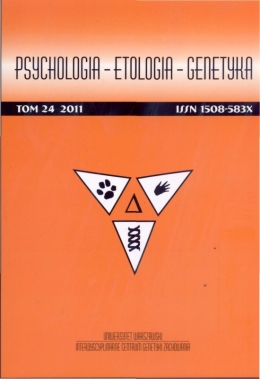Wzbudzanie emocji o genezie automatycznej bądź refleksyjnej a przejawy poznawczej kontroli w Emocjonalnym Teście Stroopa
Automatic vs. reflective emotions as moderators of cognitive control in the Emotional Stroop Task
Author(s): Kamil K. Imbir, Maria JarymowiczSubject(s): Psychology
Published by: Wydawnictwo Naukowe Scholar Sp. z o.o.
Keywords: taxonomy of human emotions; distinguishes the automatic; Emotional Stroop Task
Summary/Abstract: Two studies on the emotion–cognition relationship refer to a particular taxonomy of human emotions (Jarymowicz, Imbir 2010). This taxonomy distinguishes the automatic (homeostatic and hedonic) vs. reflective (due to cognitive self-standards and axiological concepts) emotions. It has been assumed that the diffusive and holistic automatic emotions (contrary to reflective emotions specifically connected with a particular stimulus – see Zajonc 1980, 2000) reduce ability to cognitive control and attention selectivity. According to the hypothesis, manipulation of automatic emotions lead to the lower level of performance in the Emotional Stroop Task than manipulation of reflective emotions. In two studies (with participation of students of Warsaw universities: n1 = 90, n2 = 70) participants had to name colors of neutral words or words selected as labels of different types of negative vs. positive emotions: automatic and reflective ones. In both studies the level of performance was lower during of expositions of labels of the automatic emotions than the reflective ones. The level of performance was similar for negative and positive emotions.
Journal: Psychologia-Etologia-Genetyka
- Issue Year: 2011
- Issue No: 24
- Page Range: 7-26
- Page Count: 20
- Language: Polish
- Content File-PDF

